
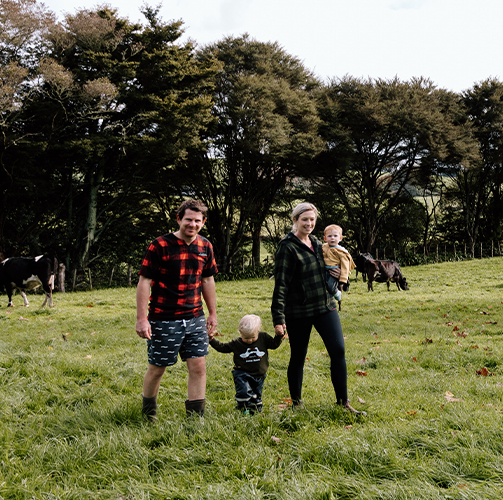
Native Nursery Courts Success
When Waikato dairy farmers Dave Swney and Alice Trevelyan decided to launch The Native Dairy Farmer, a business specialising in native plants, they found the ideal spot for the nursery: the family tennis court.
In busy Farmlands tent at the 2024 Fieldays® in June, one of the most popular attractions was a display of native plants, held in wool rather than plastic. The plants, from local nursery The Native Dairy Farmer, were being offered as part of a prize draw but visitors to the tent were clamouring to buy them. While the plants in the tent were not for sale, Alice and Dave were on hand to pass out business cards, their two young sons strapped into harnesses on their chests. Based near Te Awamutu, the Farmlands shareholders are in an equity partnership with Dave’s parents, milking 400 cows on 124ha. “We're a higher input system, but we try and keep things simple with just maize and PK as supplements with a bit of summer cropping,” Dave tells Farmlander. “We're quite a summer dry farm on ash soil, so we do calve quite early and just try and get as much production before Christmas as we can. Anything after that's a bonus.” Dave has been back on the family farm for just over a decade, after studying agriculture at Lincoln University then working for DairyNZ for five years. When he met Alice, she was working as a Senior Catchment Officer at the Waikato Regional Council. The role involved advising landowners on fencing and riparian planting to protect waterways, igniting a passion for native plants that would lead to the creation of The Native Dairy Farmer.
“My area was north of Hamilton, so I was spending a lot of time on the road,” she says. “With kids on the way, it was a good opportunity to look at something I could do from home. We were sourcing a lot of plants for our friends and farmers in the area because of my job, and so we thought ‘why not give it a go and grow our own?’ And that's where it kicked off.” As with many great ideas, the inspiration came while Alice was getting her hair done. “I went to the hairdressers after work and after a long session in the chair I came home and said, ‘I'd like to start a nursery and I'd like to have a Facebook page and to link what we're doing on the nursery to what we're doing on the farm’,” she says. “I was working with a lot of farmers at the time that were doing some epic stuff, like retiring hectares and hectares of land and changing their practices environmentally, but no one knows what's happening out there or what people are doing on farm. We only hear the negative stuff in the media. I want to change that and show the good stuff that people are doing.”

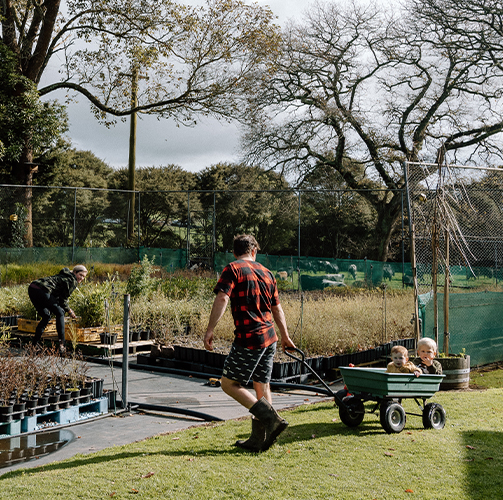
An Ace Location
As they were planning their new venture, Dave and Alice realised they had the perfect spot for a nursery right under their noses: the barely used grass tennis court on the property. “Dave’s family used to be quite into tennis, but it had become the area where the dogs ran around and it gave us lots of extra lawn to mow,” says Alice. “It was perfect for the nursery. It was fenced really well and it's flat, so we didn't have to do any landscaping. We were fortunate to have some advice from a family friend in the design and setup of our nursery. We weed matted the tennis court put up some windbreak and were lucky enough to pick up a second hand irrigation system that we repurposed. We are able to grow 25-30,000 plants out there, which is great. All our plants are grown outdoors from the beginning. We don't have any shade cloth and things like that, so they're pretty hardy.”
The nursery is surrounded by gardens full of established native trees, which gives it a bit of natural shade. They are now into their third season with the nursery, having started in 2021. Dave says they been “blown away” by how well their plants have grown. “We do get some quite harsh frosts up here and we're perched on top of the hill a little bit, but because of the natural shade and the trees that we've got around the nursery, plants just hum in there. It’s a little hothouse- it could be blowing 100km/hour out on the farm and you walk into the nursery area and it's very sheltered.”
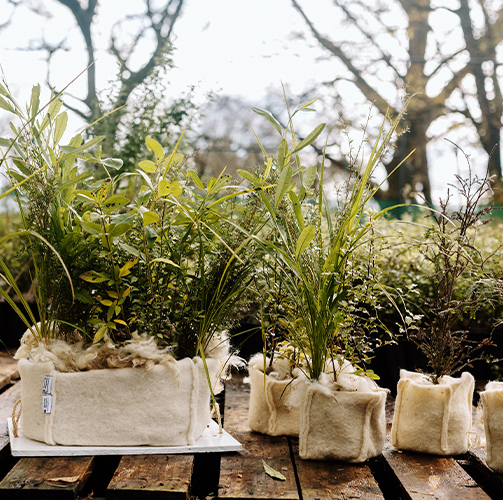

Environmentally Friendly Products
Unsurprisingly, for someone who built a career looking after waterways, Alice places a big emphasis on sustainability. While the range of natives they grow are great for the environment, they have also been looking for more sustainable options for their pots and boxes. Last season some friends of theirs purchased a pot making machine, which makes pots out of paper rather than using plastic. “Now all of our plants are grown in paper pots, which you can plant straight into the ground so there's no waste, which is really exciting,” says Alice. “We're starting to get some awesome feedback from people on how much quicker it is to undertake planting.” Unlike your traditional plastic pots the paper pot allows the plants root system to continuously grow south with no obstruction resulting in a stronger, healthier plant.
The next step to sustainability was replacing the plastic buckets they had been using to hold the plants for gifts. “We had our paper pots and then we were putting them in a plastic bucket as a gift, and it just didn't feel right,” says Alice. “You've got this awesome sustainable product and then you're chucking it into the plastic bucket.” The solution they developed was not just environmentally friendly but Kiwi made. They now use wool boxes supplied by Floating Peaks, a company created by sheep farmers Hayden and Anastasia Tristram, who make products using wool from their Hawke’s Bay farm. “I had been following Floating Peaks through our Instagram pages and I found them quite relatable,” says Alice. “They're a young couple with two young kids like us, but I really liked what they were doing. She was doing trials with wool pole protectors, which I found interesting. I got chatting with her about wool and the benefits of wool, and I asked, ‘Could you make a wool box?’ “The idea with the smaller boxes is that they fit five native plants, they sit in a wool box, and then you chop up that box and it turns into five wool weed mats. The whole product is useful and there's no waste, which is pretty cool. We’ve now also got larger boxes, which can hold 25 native plants.”
Importance of Education
Alice says most of their customers are farmers who are either doing riparian planting or hill slope planting, or retiring an area and doing restoration. “But we do have a few local lifestyle block owners and people that are wanting to use natives in landscaping, which is awesome. There's a lot of people starting to put a lot more natives in the garden as well.”The Native Dairy Farmer supplies a range of natives and Alice says it’s important to understand which plants will work best in each setting. She also warns that there’s a lot more involved in the process than simply buying the natives and planting them. “First of all, you've got to do the fencing. Sometimes if it's a really weedy site, you've got to prepare that site or graze it before planting, and then generally natives need two to three years’ post planting care just to get them fully established. You don’t just buy some plants, chuck them in the ground and walk away.”

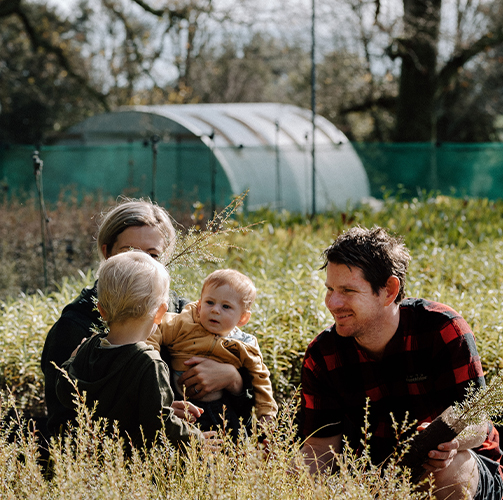
Dave adds while it’s encouraging to see so many people taking an interest in riparian planting and using natives, it’s important to seek advice before embarking on that journey. “That's where we see a lot of people get quite disgruntled with the whole process because they put the wrong plants in the wrong place and it's not successful,” he says. “It's really cool having Alice's skills to be able to not just grow the plants but provide that sort of advice for people as well. It seems to be a missing piece in the puzzle a lot of the time; just making sure people put the right thing in the right place. You want to see everyone succeed, especially because they have invested money and time into it.”
As for what they’re doing on their own farm, Dave jokes that their situation is “a bit like the builder’s house”, as they have spent so much time growing plants for other people they haven’t done as much with their land as they would like. However, they do have plans for what to do with it when they find the time. The nursery has been a real passion project of Alice’s in particular. With a young family and a farm to run Alice and Dave acknowledge the great support they have had from their families in bringing this awesome idea to fruition. “We hold some pretty high standards around animal welfare, so one of our goals is planting a lot more shade trees. It's not just about growing natives or just about dairy farming; we’re trying to link it all together because they benefit each other in the bigger picture.”
FEATURED PRODUCTS


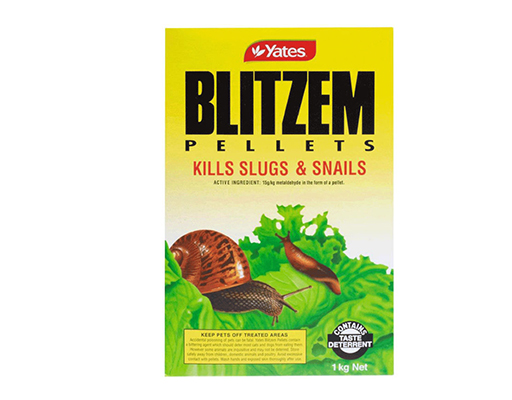
Blitzem Snail & Slug Pellets 1kg
An economical control of snails and slugs that kills through dehydration. Contains a bittering agent to help prevent accidental consumption by children and pets.
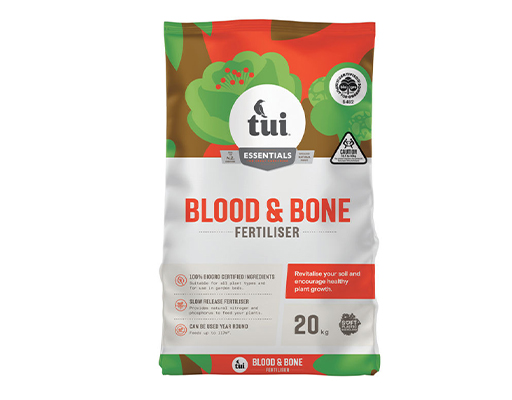
Tui Blood & Bone 20kg
Tui Blood and Bone provides your garden a natural source of nitrogen for healthy plant growth, and phosphorus for strong root development.